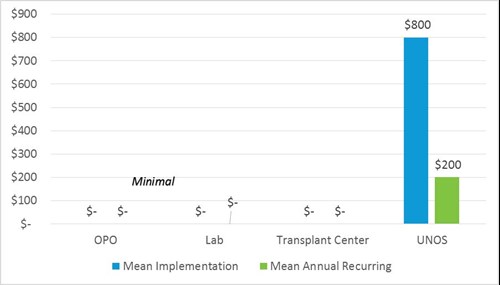Ethical considerations of imminent death donation
View commentsProposal Overview
Status: Implemented
Sponsoring Committee: Ethics
Strategic Goal: Increase the number of transplants
Board briefing 12/2016 (PDF - 136 K)
UNOS and OPTN member impact summary 12/2016 (PDF - 861 K)
Executive Summary
Beginning in 2014, the Ethics Committee (the Committee) coordinated an inter-committee work group to consider the ethical implications of Imminent Death Donation (IDD). IDD is a term that has been used for the recovery of a living donor organ immediately prior to an impending and planned withdrawal of ventilator support expected to result in the patient’s death. IDD applies to at least two types of potential donors:
(1) IDD might be applicable to an individual with devastating neurologic injury that is considered irreversible and who is not brain dead. The individual would be unable to participate in medical decision-making; therefore, decisions about organ donation would be made by a surrogate or might be addressed by the potential donor’s advanced directive.
(2) IDD might also be applied to a patient who has capacity for medical-decision making, is dependent on life-support, has decided not to accept further life support and indicates the desire to donate organs prior to foregoing life support and death.
The work group limited its focus to the first scenario involving an individual with devastating neurological injury that would require surrogate consent, and determined that this specific type of potential organ donation could be described as Live Donation Prior to Planned Withdrawal of Life Sustaining Medical Treatment or Support from a Neurodevastated Patient. This this report will use the shorthand phrase "live donation prior to planned withdrawal" or LD-PPW. This document will limit its focus to LD-PPW.
The work group’s motivations were to analyze whether, compared to existing practices of attempting donation after cardiac death (DCD), the practice of LD-PPW could:
- Honor the preferences of the potential donor (if known, concerning organ donation or the potential donor’s end-of-life care);
- Support the preferences of the potential donor’s family or surrogate;
- Increase the number of potential organ donors;
- Increase the quality of organs donated for transplantation;
- Increase the total number of organs available for transplantation.
Based on published research, organ donation does not occur among a substantial minority of individuals for whom donation after cardiac death (DCD) is attempted.3 For these unsuccessful DCD scenarios, withdrawal of life support leads to prolonged warm ischemia time that damages the organs, which are then not procured. While some tools to predict successful DCD exist, their predictive accuracy is uncertain.4, 2 Occurrences of unsuccessful DCD may be viewed as both a lost opportunity for transplantation, as well as disappointing to the surrogates of the potential donor.5 In other cases, prolonged warm ischemia may damage organs that are transplanted, leading to post-transplant complications. Additionally, there may be potential non-brain dead donors for whom organ procurement is never attempted, because of the belief that DCD would be unsuccessful.
After a thorough examination of the potential of LD-PPW, the Committee ultimately determined that there could be circumstances where LD-PPW may be ethically appropriate and justified by the potential benefits to donors, donor families and recipients. However, based on the responses and substantial concerns from nine other Committees, the Ethics Committee decided to discontinue work on LD-PPW because of its potential risks at this time, due to a lack of community support and substantial challenges to implementation. In the future, it may be possible to adequately address those challenges through additional research or careful policy development or revision.
Read the full proposal (PDF - 140 K)
Feedback requested
The Committee is seeking feedback concerning if there could be circumstances where IDD may be ethically appropriate and justified by the potential benefits to donors, donor families and recipients.
Does the risk for the erosion of public trust in the organ donation system outweigh the potential for IDD to increase in the number of organs available for transplant?
UNOS and OPTN member impact summary

Project size/Complexity
UNOS and member
Implementation hours for UNOS and members are minimal.
Ongoing annual hours for UNOS and members are minimal.
Project size = Very Small



